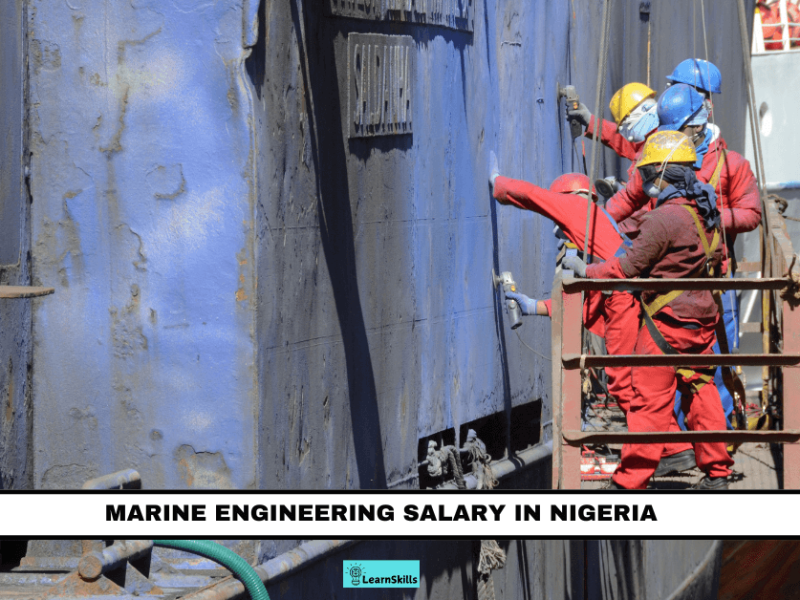If you’re considering a career in marine engineering in Nigeria, understanding the salary landscape is crucial.
The average salary for a marine engineer in Nigeria is approximately ₦1,051,500 in 2025. This figure can vary widely based on experience, location, and the specific sector of marine engineering you enter.
In bustling cities like Lagos, the salary can range from ₦150,000 to ₦448,638 monthly depending on company size and specific job duties.
For those working offshore, the earnings can be significantly higher, with annual salaries reaching between ₦25 million and ₦55.8 million. This potential for increased earnings makes marine engineering an enticing career option for individuals interested in this dynamic field.
Overview of Marine Engineering in Nigeria
Marine engineering plays a crucial role in Nigeria’s maritime industry. It involves the design, maintenance, and management of marine vessels and offshore structures. This field addresses international regulations to ensure safety and efficiency in operations.
Role of Marine Engineers
As a marine engineer, you focus on various tasks, including the design and construction of ships and other marine vessels.
Your responsibilities extend to the maintenance of engines, electrical systems, and overall vessel operations.
You also ensure compliance with international regulations that govern maritime safety and environmental standards. This includes inspections and certifications to meet industry requirements.
Marine engineers contribute significantly to the economy by supporting shipping, fishing, and oil exploration industries. Your expertise helps maintain the safety and performance of vessels, which is vital for trade and transport.
Scope of Marine Engineering
The scope of marine engineering in Nigeria includes a variety of sectors within the maritime industry. You can work on different types of vessels, such as cargo ships, tankers, and fishing boats.
Your role may also involve managerial positions or research and development for new technologies.
Maritime engineering faces challenges such as aging infrastructure and the need for skilled professionals. As the industry evolves, you will adapt to new regulations and technological advancements.
This dynamic field promises opportunities for growth and development as Nigeria enhances its maritime capabilities and expands its global trade influence.
Marine Engineering Salary Structures
Marine engineering salaries in Nigeria vary based on factors like experience and the specific roles within the field.
Salary Comparison by Experience
Salaries for marine engineers in Nigeria depend largely on experience. Here’s a basic outline of expected monthly salaries:
- Marine Engineering Trainee: ₦150,000 to ₦250,000
- Junior Marine Engineer: ₦300,000 to ₦500,000
- Senior Marine Officer: ₦600,000 to ₦1,200,000
With years of experience, you can transition from a trainee to a senior officer, significantly increasing your earning potential. In major cities, like Lagos, salaries might be slightly higher.
Benefits and Allowances
In addition to salary, marine engineers often receive various benefits and allowances. These may include:
- Health Insurance: Comprehensive medical coverage for you and your family.
- Housing Allowance: Financial support for accommodation, especially in high-cost areas.
- Transportation Allowance: Assistance for travel expenses to and from work sites.
These benefits enhance the overall compensation package, making marine engineering positions attractive. As you advance in your career, the quality and quantity of these allowances can improve significantly.
Essential Qualifications and Recruitment Requirements
To become a marine engineer in Nigeria, you need specific qualifications and skills. These ensure you meet the expectations of employers and can perform effectively in various roles.
Educational Credentials
You must have a degree in marine engineering or a related field. This usually means completing a Bachelor’s degree from a recognized university or college. Some employers may also prefer candidates with a Master’s degree for advanced positions.
Additional certifications can be beneficial. Consider earning a license from the Council for the Regulation of Engineering in Nigeria (COREN). Continuous education through workshops or courses can enhance your knowledge and skills.
Having internships or practical experience is also important. Hands-on training during your education helps you understand real-world applications of your studies.
Skill Set and Competencies
Employers look for specific skills in marine engineers. Strong problem-solving abilities are essential. You need to analyze technical issues and create effective solutions.
Technical knowledge is key in reading and preparing technical reports. You should understand marine systems, computer-aided design (CAD) software, and engineering principles.
Communication skills are crucial. You must work with other engineers, technicians, and non-technical staff. Lastly, teamwork is important. You often work in groups on projects. Being able to collaborate effectively is vital for success in marine engineering roles.
Career Progression in Marine Engineering
Career advancement in marine engineering involves several stages, from starting as a trainee to achieving senior roles.
From Trainee to Senior Officer
As a marine engineering trainee, you begin your journey by working under the guidance of experienced officers. After gaining foundational skills and knowledge, you can progress to positions like a junior engineer or officer.
With experience, you can advance to senior marine officer roles. In these positions, you supervise engineering department activities and work with marine equipment.
Salaries for senior officers can range significantly, usually starting from NGN 448,638 per month and increasing with experience and responsibility.
Continued Professional Development
Continued professional development is vital in marine engineering. You should pursue certifications and further training to stay current with industry changes.
Consider enrolling in training programs focused on specialized marine equipment and safety standards. These qualifications not only enhance your skills but also improve your earning potential.
Joining professional organizations can provide valuable networking opportunities and resources. This support will help you learn about new technologies and best practices, further aiding your career advancement in marine engineering.
Day-to-Day Responsibilities and Challenges
As a marine engineer in Nigeria, you face specific responsibilities daily that are critical to the safety and efficiency of the vessel.
Routine Equipment Maintenance
Your routine maintenance tasks cover a variety of systems. You focus on components such as engines, pumps, and sewage systems. Regular checks are essential to avoid downtime and ensure smooth operations.
Key tasks include:
- Inspecting machinery for wear and tear.
- Conducting machine overhauls to keep engines running efficiently.
- Monitoring life-saving equipment to ensure it is operational and ready for emergencies.
Maintaining a schedule for these tasks helps you track performance and identify potential issues early. By doing so, you ensure the vessel operates safely and efficiently.
Adhering to Safety and Environmental Protocols
You must prioritize safety to protect both crew and the environment. This includes following strict safety protocols and using pollution preventatives to avoid spills and contamination.
Important aspects involve:
- Regular drills for emergency situations to maintain crew readiness.
- Conducting routine safety checks on life-saving equipment.
- Implementing measures to minimize pollution, especially near marine environments.
Following these protocols not only protects the crew but also safeguards marine ecosystems. Your commitment to safety and environmental responsibility is a vital part of your daily role.
Interaction with Contractors and Regulatory Bodies
Interacting with contractors and regulatory bodies is crucial in marine engineering. These relationships impact project success, compliance, and overall effectiveness in the field.
Project Management and Reporting
When working with contractors, clear communication is vital. You should prepare technical reports that detail project progress, challenges, and solutions. These reports help keep all parties informed.
Setting up regular meetings with contractors is beneficial. This ensures that everyone is on the same page regarding deadlines and responsibilities. Use project management tools to track tasks and share updates.
Key elements to focus on include:
- Timeline adherence: Ensure projects stay on schedule.
- Budget management: Keep costs within limits.
- Quality assurance: Maintain high standards.
These practices make collaborations smoother and enhance project outcomes.
Compliance with Maritime Regulations
Regulatory bodies set essential guidelines that you must follow. Understanding these regulations ensures projects conform to safety standards and environmental protection.
You should familiarize yourself with local and international laws governing marine operations. This includes safety protocols and environmental safeguards, which protect marine life and habitats.
Make sure to conduct safety inspections regularly to meet requirements. Also, evaluate the environmental impact before projects begin.
Regular liaison with regulatory bodies helps in staying updated on any changes in laws. Prepare compliance documentation to avoid penalties and ensure smooth approvals.
Consider the following areas:
- Safety inspections: Conduct them regularly to meet requirements.
- Environmental assessments: Evaluate impact before projects begin.
By engaging effectively with these entities, you can enhance both project safety and success.










